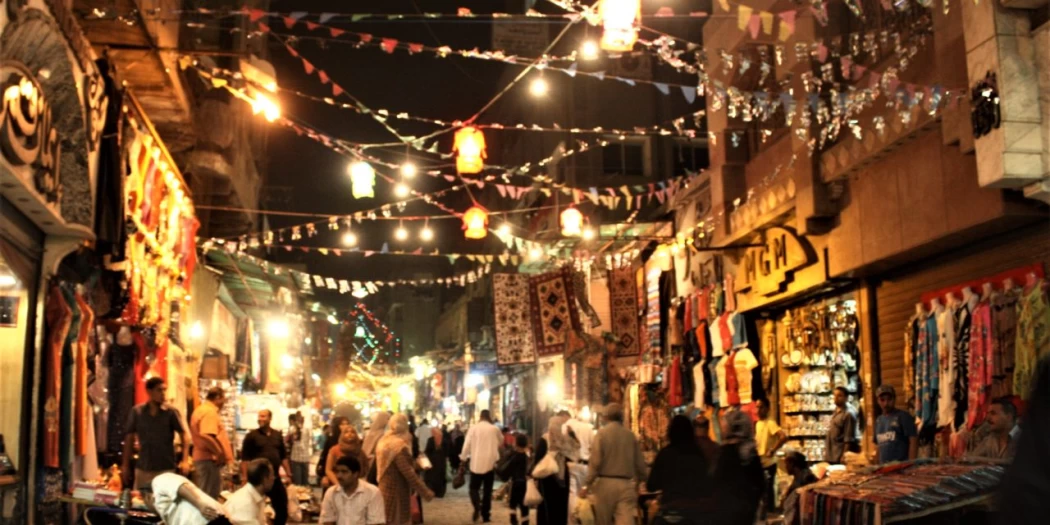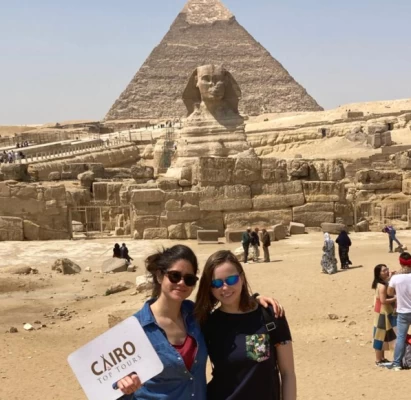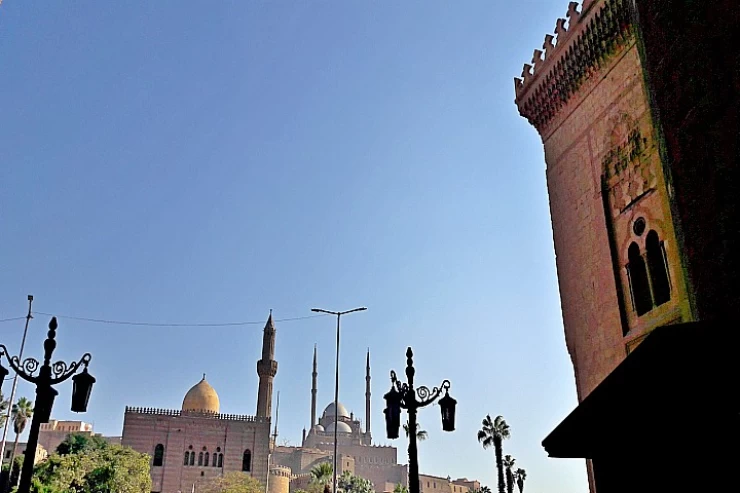
Ramadan no Egito
O Ramadã no Egito
O Mês Árabe do Ramadan
A palavra Ramadan é derivada da raiz árabe ramiḍa ou ar-ramaḍ, "o calor abrasador", "seca".
O mês do Ramadan é onde o Alcorão foi revelado. Orientação para a humanidade, prova clara de diretrizes, padrões (certo e errado).
O Ramadã é o nono mês do ano lunar islâmico. É hora de jejum, bênção e orações para comemorar os primeiros versos do Alcorão Sagrado do Profeta Maomé pelo Espírito Santo Gabriel. Como é uma época em que os muçulmanos se abstêm de comer durante o dia como sacrifício para lembrá-los dos desafios dos pobres.
Apesar dos tempos semelhantes em si mesmos, eles diferem na bondade e na orientação que ocorre neles, e Deus Todo-Poderoso destacou o abençoado mês do Ramadã com muitas vantagens que lhe rendem um santuário e aumentam o apetite das pessoas por boas obras durante o mesmo,
Quando você planeja suas viagens ao Egito durante o Ramadã, você notará que uma das características do mês é que Deus Todo-Poderoso revelou seu sábio livro Para purificar os corações e encher as mentes de sabedoria, onde Deus Todo-Poderoso enviou o Sagrado Alcorão ao céu mais baixo em uma frase, ou o início da descida do Alcorão nele, então seus versos foram revelados de acordo com o que a sabedoria de Deus Todo-Poderoso requer, e o que distingue o mês do Ramadã que Deus Todo-Poderoso impôs aos muçulmanos que jejuam durante seu dia Deve-se notar que o jejum tem grandes implicações para os servos, pois ele purifica sua moral, limpa seus corações e se repara
A característica mais marcante deste mês é a presença da maior noite, que é a Noite do Poder, na qual o Sagrado Alcorão foi revelado ao nosso mestre Muhammad - que Deus o abençoe e lhe conceda a paz - e sua descida foi no ano seiscentos e dez d.C., e então o Mensageiro - que Deus o abençoe e lhe conceda a paz - estava presente na caverna de Hira, e nisto, O lugar foi revelado pela revelação de Gabriel - sobre ele seja a paz -, e o primeiro verso foi-lhe revelado é o ditado Todo-Poderoso: "Leia em nome de seu Senhor que criou", e o Alcorão Sagrado foi revelado imediatamente na Noite do Poder que foi sua descida da tábua preservada.
A razão para nomear este mês deve-se ao fato de que a palavra Ramadan deriva da origem do Ramadan, que é definida como a intensidade e força do calor, e sua derivação se baseia no peso do Ramadan, o que significa que ele se tornou mais quente, e o calor passou no sentido de que o calor aumentou de intensidade sobre eles, e nessa época eles transferiram todos os nomes dos meses de O idioma que prevalecia nos velhos tempos, e começaram a chamá-lo nomes relacionados aos tempos, e isto corresponde ao Ramadan durante os dias do Ramadan, o que significa calor extremo e forte, e desde então foi chamado de Ramadan.
Um muçulmano jejua durante o Ramadã, e ele é uma das orações obrigatórias que foi imposta aos muçulmanos, e é um dos cinco pilares do Islã, que a religião islâmica só é válida com ele. E este tempo é especificado para todas as partes da Terra com uma diferença de tempo. Entre os benefícios mais importantes do jejum está o fato de que ele trabalha para purificar e purificar a alma humana e se aproximar de Deus Todo-Poderoso ao se comprometer com a imposição do jejum, e neste grande mês todas as portas do inferno estão fechadas, e as portas da misericórdia e do perdão estão abertas para os muçulmanos,
As isenções ao jejum incluem viagens, menstruação, doenças graves, gravidez e amamentação. Entretanto, muitos muçulmanos com condições médicas insistem em jejuar para satisfazer suas necessidades espirituais, embora isso não seja recomendado pelo hadith. Aqueles incapazes de jejuar são obrigados a compensar os dias perdidos depois.
Suhur é a refeição consumida de manhã cedo pelos muçulmanos antes do jejum (serragem), antes do amanhecer durante ou fora do mês islâmico do Ramadã. A refeição é consumida antes da oração fajr. Suhur é igualado ao iftar como a refeição da noite, durante o Ramadã, substituindo as três refeições tradicionais por dia (café da manhã, almoço e jantar), embora em alguns lugares o jantar também seja consumido depois do iftar mais tarde durante a noite.
Sendo a última refeição comida pelos muçulmanos antes do jejum, da madrugada ao pôr-do-sol, durante o mês do Ramadã, Suhur é considerado pelas tradições islâmicas como um benefício das bênçãos, pois permite à pessoa que jejua evitar a manivela ou a fraqueza causada pelo jejum. Segundo um hadith em Sahih al-Bukhari, Anas ibn Malik narrou: "O Profeta disse: 'tome suhoor como se houvesse uma bênção nele'".
Ao pôr-do-sol, as famílias quebram o jejum com o café da manhã, e a refeição abre tradicionalmente, onde as pessoas começam a quebrar suas datas com umidade, enquanto bebem leite, religião da lua e uma bebida, e alguns podem gostar de beber sucos frescos, como laranjas, mangas ou melões. Após retornar da oração Maghrib, as pessoas começam a comer Molokhia, sopa e vegetais mistos, massa com bechamel, e decorar a mesa com uma salada verde ou salada de iogurte com pepinos, folhas de videira recheadas, e o prato principal é frango grelhado ou alguma grelha, como kebab e kofta.
Depois de terminar a Iftar, alguns doces devem ser adocicados, os mais famosos dos quais são: Konafa, Qatif, Baklawa, Mohalabiya e Umm Ali, e este, naturalmente, varia de mesa para mesa, de acordo com o gosto de cada família.
Um dos costumes que caracterizam este país é o que é conhecido como mágicos, uma pessoa que passa pelos bairros e casas a fim de acordá-los no momento de suhoor com seu famoso chamado: Deus", e o Al-Maserati - ou Al-Muhuroor como em alguns países - apareceu no terceiro século AH, e depois se espalhou em muitos países árabes. Começou a diminuir como resultado da disponibilidade de ferramentas modernas de despertar, tais como despertadores e outros, e não existem mais, exceto em aldeias e vilarejos Modéstia popular.
Cairo Top Tours oferece as melhores ofertas e preços para você passar o Ramadã no Egito uma variedade de Egypt Classic Tours, tours privados no Cairo, Egypt Day Tours, Cairo day tours do aeroporto, e Egypt Travel Packages Luxor day tours, Aswan day tours para satisfazer seus sonhos e ver as ruas, casas e mesquitas decoradas com luzes coloridas e correias, Deixe-nos ajudá-lo a planejar seus pacotes clássicos para o Egito e cobrir a maioria das famosas mesquitas do Oriente Médio construídas pelos poderosos Reis e Sultãos do Egito durante a era medieval, Há apenas algumas semanas para o Ramadã vir, reserve agora para o próximo Ramadã do Egito Férias e pacotes de férias no Egito e visite mais lugares durante a excursão às pirâmides de Gizé e à Esfinge, excursão ao Museu Egípcio, Excursão ao Vale dos Reis, Excursão ao Cairo Copta e Excursão ao Cairo Islâmico.
The word Ramadan is derived from the Arabic root ramiḍa or ar-ramaḍ, "the burning heat" and "drought." The month of Ramadan is when the Qur'an is revealed. Guidance for humanity, clear proof of guidelines, standards (right and wrong).
Ramadan in Egypt: A Month of Spirituality, Tradition, and Celebration
Ramadan is a time of utmost reverence for Muslims all over the world, and in Egypt, the month is even more adored by its people. It is full of fasting, prayers, charity work, and get-togethers and spans the period that celebrates the initial salutation of the Quran to the prophet Muhammad. Such is the country’s richness in her Islamic cultural values combined with the aliveness of her people’s way of life that each year during the month of Ramadan, Egypt becomes an enchanting wonderland. Where the old ways of observing the month complement the new festivities in a very beautiful way. The cities, the houses, and the temples are religiously, socially, and emotionally vibrant, filled with gaiety and togetherness.
Rush needs to ensure that the primary organizations and institutions in the society are nourished with soft power values, and the modern leaders of this country possess those values that were targeted for localization of the conceptual ones. Also, the descriptive, definition-based ideas were localized.
There is more to Ramadan in Egypt than simply refraining from eating and drinking from dawn to dusk—it is a season to dwell upon one’s self, grow in one’s spirituality, and reconnect with faith. For the month, Egyptians also spend more time praying, reading the Quran, and doing good work. The places of worship are crowded with people, especially during the Taraweeh prayers that are conducted every night after the Isha prayer.
In Cairo, the Al-Azhar Mosque has remained one of the venues for such congregations, likewise the imposing Mosque of Amr ibn al-As, which is the oldest mosque in Africa. There comes a time in the city when the cry of Adhan is heard so loud, signifying a reminder of the sacredness of that particular month. Even to the busy people, it seems there is a posture of calm and respect within the city that is a capital.
Iftar: A Celebration of Community and Generosity
As the twilight descends, the peculiar period termed ‘Iftar’ commences, marking the conclusion of an established fast for the day. There is a sweet smell of the local delicacies of Ramadan wafting from the kitchens and restaurants in the Egyptian territories. Families come together at the Iftar for the essence of waving the fast and benefiting from gluttony. The initial one is taken with dates and a glass of water like the prophet Muhammad used to have before any meal—there is a range of Egyptian dishes served soon after.
Examples of the most preferable Iftar meals include molokhia (African gaea soup), mahshi (stuffed with rice and seasoning vegetables), foul (a dish of boiled fava beans), and koshary (a dish made of rice and noodles served with lentil sauce). Ramadan is not only experienced with food, which is why sweet dishes such as kunfa (syrup in a thin crust filled with cream or cheese), basbousa (syrup-soaked semolina cake), and atayef (stuffed mini pancakes) are adored in Egypt.
Crossing the bounds of in-house courtesy, Ramadan is also a season of selfless benevolence. Across the land of Egypt, there are Mawa’id al-Rahman, or tables of mercy, placed in different street corners and localities to provide free Iftar meals to all those who come. This practice of sharing and giving extends to the overall sense of community and charity that Ramadan represents.
As the lingering shadows of night hang around just before the break of dawn, a cherished Egyptian custom comes into play. The Mesaharati is a man who walks around the streets hitting a drum and calling people to wake for the meal of Suhur, which helps sustain Muslims during the fast before dawn. His well-articulated yells, customarily with the names of people residing in the locality, however, also vibrate in the narrow alleys and still areas.
This time-honored practice, which many people have continued to engage in, makes Ramadan in Egypt more attractive. In some places, children also costlessly attach their respective Mesaharati and their pleasant early morning activities.
The Fanoos: Ramadan’s Glowing Symbol
One of the most delightful things about Ramadan in Egypt is how the colored lanterns are found in homes, mosques, and even the streets throughout the holy month. These fans represent the month of Ramadan in Egypt, and their use can be traced back to the Fatimid period. It is said that the people came out with fanooses in their hands when the Fatimid ceaser al-Mu’izz li-Din Allah entered Cairo in the holy month, thus the custom has been there ever since.
At the present time, these beautiful fanooses have reached not only the capital but also all other cities, turning them into an enchanting holiday. Certainly, families decorate their houses with fanooses, while children perform wearing them and singing riddles about the fasting month, and it works magically.
Ramadan Nights: A Time of Celebration
These streets of Egypt do not stay quiet after the Iftar meal is over. The scope of Ramadan night extends to pleasure, interaction, and a variety of events. The cafes, the restaurants, and the shops are mostly open till dawn, allowing the Egyptians to enjoy themselves with music, take a walk amidst the bright lights if they feel like it, or simply unstress themselves.
Kheimaat Ramadan-erected cultural tents are found scattered in the city. Offering various entertainment activities and Suhur foods. Within these tents, fringe stages are further enlivened with entertainment in the form of Tannoura (Sufi whirling dervishes), music, poetry, and many other forms of live artistic expression. There is no look back in how most of the Egyptians viewed those days when pampering the senses was as important as taking part in spiritual elevation.
Ramadan is the culmination period marked by Eid al-Fitr, which in English translates to the “Festival of Breaking the Fast.” Various festivities accompany this day, the most customary being the special prayers offered at mosques and open spaces throughout the cities of Egypt. Families gather to rejoice with meals, presents, and new attire, and children are offered Eideya, a form of monetary present.
In essence, Eid al-Fitr encompasses happiness and thanksgiving for the ability to finish the fasting intervals. This period is also to appreciate the necessity for the continuation of those activities, as Egyptians also engage in charity by giving food and clothes to the poor.
Ramadan in Egypt
Ramadan is the ninth month of the Islamic lunar year. It is time for fasting, blessing, and prayers to commemorate the first verses of the Holy Qur’an of the Prophet Muhammad by the Holy Spirit Gabriel. It is a time when Muslims refrain from eating during daylight hours as a sacrifice to remind them of the challenges of the poor.
Despite the similar times themselves, they differ in the goodness and the guidance that takes place in them, and God Almighty has singled out the blessed month of Ramadan with many advantages that earn it a sanctuary and increase people's appetite for good works during it.
Traveling and Visiting Egypt during Ramadan Month
When you plan your tours to Egypt during Ramadan, you will notice that one of the characteristics of the month is that God Almighty revealed his wise book. To purify the hearts and fill the minds with wisdom, where God Almighty sent the Holy Qur’an to the lowest heaven in one sentence or the beginning of the descent of the Qur’an in it, then his verses were revealed according to what the wisdom of God Almighty requires and what distinguishes the month of Ramadan that God Almighty imposed on Muslims fasting during its day. It should be noted that fasting has great implications for servants, as he purifies their morals, cleanses their hearts, and repairs themselves.
The most distinguishing feature of the Ramadan Festival in Egypt is the presence of the greatest night, which is the Night of Power, in which the Holy Qur’an was revealed to our master Muhammad—may God bless him and grant him peace—and his descent was in the year six hundred and ten AD, and then the Messenger—may God bless him and grant him peace—was present in the cave of Hira, and in this, the place was revealed by the revelation of Gabriel—upon him be peace—and the first verse was revealed to him is the Almighty saying: "Read in the name of your Lord who created," and the Holy Qur’an was revealed at once in the Night of Power, which was its descent from the preserved tablet.
The reason for naming this month is because the word Ramadan is derived from the origin of Ramadan, which is defined as the intensity and strength of the heat, and its derivation is based on the weight of Ramadan, which means that it has become hotter, and the heat has passed in the sense that the heat has increased in intensity on them, and at that time they have transferred all the names of the months from the language that was prevalent in the old days, and they began to call it names related to the times, and this corresponds to Ramadan during the days of Ramadan, which means extreme heat and strong, and since then it was called Ramadan.
Ramadan Traditions in Egypt and rites consist of Muslims fast during Ramadan, it is one of the obligatory prayers that was imposed on Muslims, and it is one of the five pillars of Islam, which the Islamic religion is only valid. This timing is specified for all parts of the Earth with a difference in timing. Among the most important benefits of fasting is that it works to purify the human soul and draw closer to God Almighty by committing to the imposition of fasting, and in this great month all the gates of Hell are closed and the doors of mercy and forgiveness are opened to Muslims.
Exemptions to fasting include travel, menstruation, severe illness, pregnancy, and breastfeeding. However, many Muslims with medical conditions insist on fasting to satisfy their spiritual needs, although it is not recommended by hadith. Those unable to fast are obligated to make up the missed days later.

















